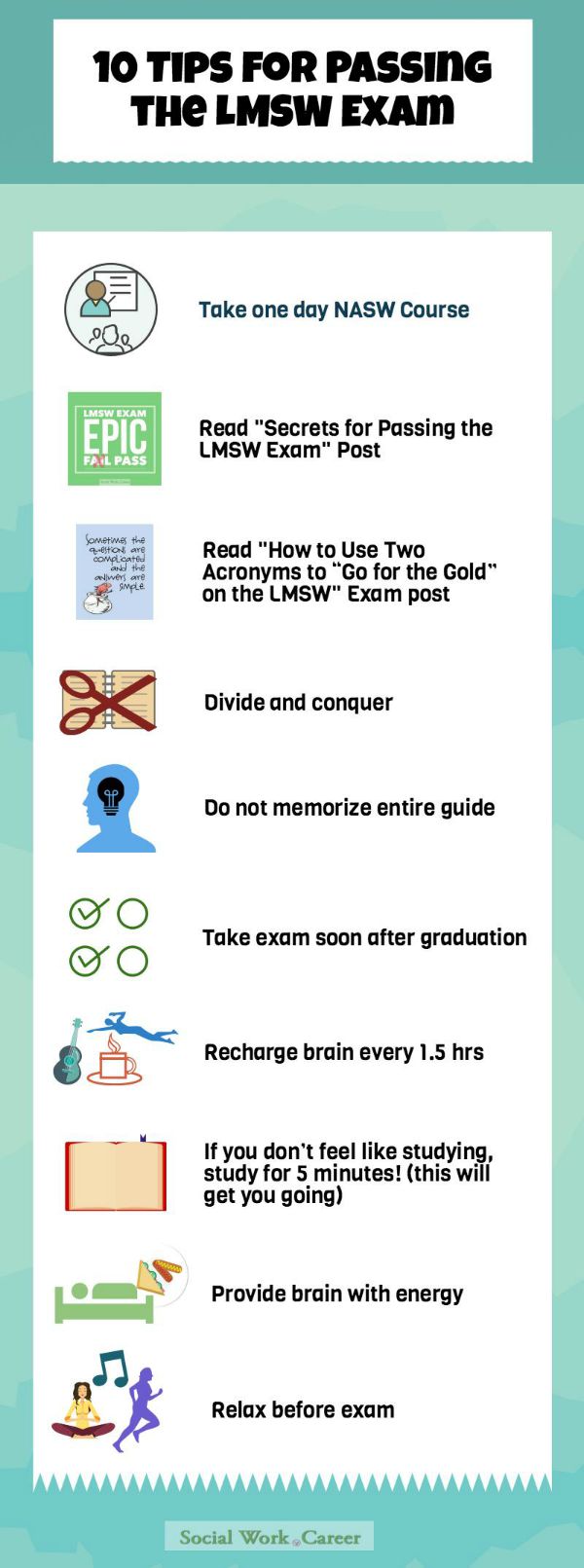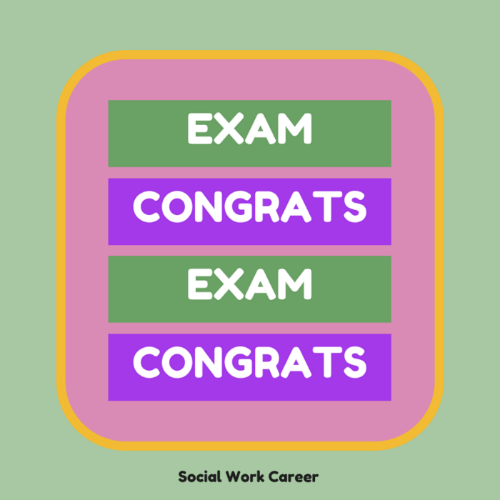How I passed my LMSW exam and you can too !
- Take the National Association of Social Workers’ (NASW) Preparation Course – it is a one-day course that not only prepares you mentally for the big day but also provides you with an invaluable study guide that covers all that you need to know for the exam
- Divide and Conquer: After you know when your exam date is scheduled for, figure out approximately how many pages you need to cover per day/week to finish going through the entire study guide [giving yourself some leeway for some sick days or days when you won’t have the time etc.] and then try your best to stick to this schedule.
Also, note that certain sections will be harder to get through than others in terms of reading and/or trying to retain.
In terms of the studying, don’t just read through the material and/or highlight. As per this article on studying strategies, studying evenly and practice testing are the two most effective strategies.
- Do not attempt to memorize the whole study guide. Instead:
1) read through the whole book once [employing the highlighting technique] – I had done this prior to the “divide and conquer” technique
2) take notes during the “divide and conquer” phase
3) memorize only key items from your notes as you get close to the date of the exam
4) take the test exam at the back of the study guide once you have finished – I spread out the sample test over three days as a review the week before my exam.
If you like, you can take additional practice tests. See Tools to Help You Pass the LMSW Exam for free practice exams.
- Try to take your exam as soon as you can after you graduate. This way, you are more likely to have some of the information covered in the exam fresh in your mind, from the classes you took at graduate school.
If you end up having to take your exam, a year or longer after you have graduated (as I did), you can still do fine. Just try to stay current 🙂
To keep up-to-date, you can: attend continuing education classes, webinars, listen to informative podcasts such as those provided by InSocialWork or The Social Work Podcast, read social work articles and/or participate in mental health twitter chats like those hosted by @SWSCmedia or @swhelpercom.
How Neuroscience/Willpower Learnings Can Help Prepare You for the Exam:
- Don’t study for too long; re-charge your brain every 1.5 hrs with some meditation/exercise/20-minute nap.
- If you don’t feel like studying, that’s ok. Tell yourself, I will study for just 5 minutes. You can usually get yourself going to do something for just 5 minutes.
And once you are studying for 5 minutes, you will be able to study for longer and feel so good about what you have done!
- Provide your brain with a steady supply of energy through food and adequate rest throughout the period of time that you are preparing for the exam.
- Meditate before taking the exam (or engage in another type of activity like exercise etc. that can help you clear/relax your mind)
I wish you the best of luck on your exam!
Are there other study tips that you would add to the above?
References:
McGonigal, K. (2012). The willpower instinct: How self-control works, why it matters, and what you can do to get more of it. New York: Avery.
Schwartz, T. (2013). Relax! You’ll be more productive. New York Times.




Congratulations!
Thanks 🙂
Congratulations.
Thanks so much, Rachel – It is so nice to have the exam behind me 🙂
That’s great, Dorlee! I’ll bet that you feel wonderful getting that behind you … and those initials behind your name! 🙂
These are excellent suggestions for anyone who faces an exam or test.
I particularly liked that you suggested using neuro-science!
Warmly,
Marianna
Thanks so much, Marianna
The neuroscience learning were both necessary and helpful for me because my mother’s illness/death had sidetracked my initial “divide and conquer plan.” The 5 minute rule helped me get back on the studying horse, so to speak, after a long break 🙂
Warmly,
Dorlee
Hi Dorlee! I took my exam today, and I’m so happy I passed! I definitely found that studying for 90 minutes, followed by a 15 minute break was best for me. I began studying off and on for over a month, then I took this past week to spend 8 hours a day studying (breaks included). Was that the best thing to do? probably not, but I’m so happy I passed on the first try! I also found it useful to write own what I was studying, as I find that writing things down in my own words helps me with memory recall.
Congrats on passing your exam, Nicole! I’m so happy for you 🙂
Also, thank you for sharing how writing down what you were studying was a useful method for memory recall – this is something that I also did [but forgot to mention, no pun intended].
I have a question…. The Acryonym AASPIRINS is very helpful but I’ve encountered some confusion regarding substance abuse and “intoxicated, don’t treat, refer”. In 2 of the practice questions when the client presented with sub. abuse/dep issues the correct answer was to deal with most debilitating issues first so if I would have choosen to “refer” for substance abuse, it would have been incorrect. Can someone clarify….? thanks! 🙂
Hi Anonymous,
I’m glad to hear that the acronyms are usually helpful.
Could you share the full wording of one of these two substance abuse questions so that I can see what you mean?
Taking the exam just after grad isn’t always the best option. I found that my work experience (community mental health) more than prepared me. I probably wouldn’t have done as well otherwise.
I just graduated 2 weeks ago and took my exam last weekend. I failed by 1 point 🙁 this was so hard to cope with since I thought I did everything I could to be successful. Pre-course, pre-test, etc. I think maybe my reading too much into the questions and anxiety got the best of me. I guess I can only keep reading the tips and test again in 90 days! Thank you all for the insight!